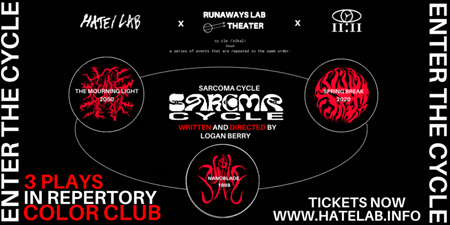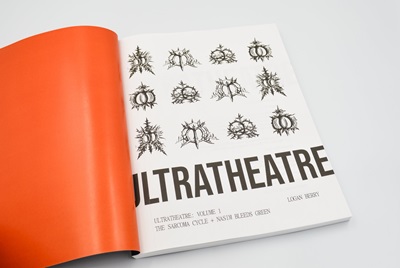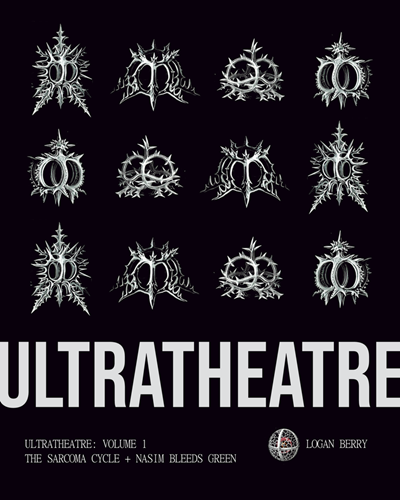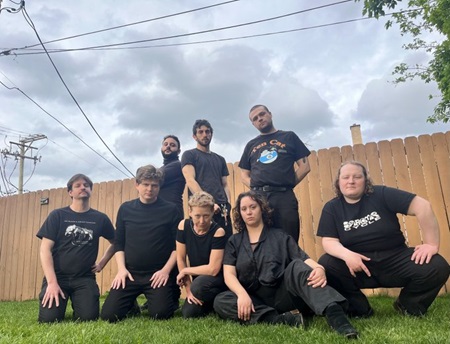
Interview: Logan Berry with Caroline Macon Fleischer
Logan Berry's Sarcoma Cycle is the first repertory production to be produced in Chicago in over a decade. But as a multi-disciplinary artist, he's no stranger to insane, fearless energy.
▄▀▄▀▄▀▄▀▄▀▄▀▄▀▄▀▄
CMF
Logan, I'm excited to interview you! I've always admired your art for its wacky combination of playfulness and gall. Now, in the year of your first child, here you are! Producing an oozing, cerebral, medical tech tryptich that spans over 50 years. What possessed you?
LB
It's a pleasure and an honor, Caro. I drafted the plays in notebooks while accompanying my mom throughout her cancer treatment in 2022. It's incurable. It's in her blood. She's stable for now. I wanted to know why doctors are always glued to their computers. How did we get here, and where are we heading? Per the press release, the plays "reflect the intimate context in which they were written, as well as the grandiose ambitions of a writer reckoning with our strange times."

CMF
I'm thinking of my own favorite multi-part plays. I love Tarell Alvin McCraney's
Brother/Sister Plays trilogy and, of course, the two-part
Angels in America. Going further back,
The Oresteia. Tackling your own
Sarcoma Cycle, what triptychs inspired you? And converseley, were there any tropes in the genre that you wanted to avoid?
LB
The Oresteia, as you said. Ancient forces endure, albeit with novel lexical disguises. Call a behavioral problem a "psychopathology" or call it a "demon"; they're divergent in diagnostic format but alike in impact. Ancestral curses fester in our DNA. Fate retains its grip; it crushes the mental shackles imposed by algorithmic governance with its course-altering ruptures. With
Sarcoma I aimed to invoke these forces and more.
The Medieval Mystery Plays, during which the different craft guilds performed liturgical stories together. Over many days, they presented Biblical tableaux, pageants, and plays on mobile wagons and carts in the public square. The durational, ritualistic, and architectural aspects of this are very interesting to me. And that ordinary craftspeople would participate.
Lars Von Trier's thematic trilogies. I like that the works vary from one another in terms of genre and style. Calling them a “thematic trilogy" provides an organizing principle and raises the stakes of each one by making them portions of a larger vision. Other trilogies in this vein, all of which I appreciate: Ariana Reines'
Telephone, Matthew Barney's
Cremaster Cycle (which probably means I'm indirectly influenced by Wagner), John Waters'
Trash Trilogy, Fassbinder's
BRD, Christoph Schlingensief's
Germany Trilogy, Tom Six's three-sequence
Human Centipede, Philip K. Dick's
Valis.
I wasn't interested in writing or staging a plot-driven triptych. I wanted something more expansive and wilder, that could offer audiences ample space to think and feel freely.
CMF
Reflecting on these three plays, something stuck in my gut is your fascination with med tech. On one hand, these stories are dire and threatening, akin to something like
Clockwork Orange body modification horror. But in the underbelly, they're softer, more hopeful. What drives each of these pieces isn't so much technology of ravaging people and their loved ones, but helping these characters realize what matters to them in a a human way. It's sort of sweet. How did you parse out your feelings on med tech in life? Is this something you'll continue to wrestle with?
LB
If a medical intervention facilitates human flourishing, that is excellent, and bravery in the face of illness can be astonishing to behold—mythic, even. But it seems to me that many medical advances forestall death by prolonging decay. I wonder if our time would be better spent figuring out how to die a good death rather than hanging onto mere life.
CMF
Post-pandemic, I have a sense that people have lost PATIENCE with theatre as an art form and I want to get to the bottom of it. Is that your sense, too, and why do you think that is? In the grand scheme of things, a play trilogy isn't much different from, like, a miniseries. Yet, there's something about going to the theatre which now seems to exhaust people. In what ways does your project push back on that feeling?
LB
Theatre needs to get its nose out of its own ass and make something worth attending. I'm sick of it too. The ads are corny and self-righteous. The plays are sanctimonious and basic. Theatremakers are some of the most heavily propagandized, aesthetically bankrupt artists alive. It's no coincidence that so many in the halls of power
were former theatre kids.
Both of our
Sarcoma Cycle marathon shows—where we did all three plays back-to-back in one day—were completely sold-out. The audience responses were incredible. They gave standing ovations, bought all the merch, and hung around after to discuss the plays with us. The audiences loved a challenging, no holds barred experience. If theatre is dead, then it's time to shock its corpse.
CMF
I'm curious about ways your personal experiences infiltrated the plays. For example, your wife is a nurse who works overnights and you, also, have direct experience both in teaching GED in prisons and working graveyard shifts at a group home, too. On top of that, you're a new dad. What role did sleep deprivation play in this creative process and did it ultimately play to your benefit?
LB
While it's true that many of my books were written during heightened states of distress and sleep deprivation, I wrote
Sarcoma Cycle while getting plenty of sleep.

CMF
I've read much of your writing over the years and something I love about your work is your metal willingness to attack the darkest of dark with a sense of humor. Where does this playful spirit come from and are you ever afraid of ruffling feathers?
LB
Our time alive is limited, and I want an art attuned to its limits, that's libidinal, vulnerable, and true. I want it to take my head off, as Dickinson said. I want an art that wounds. If feathers are ruffled along the way, I wouldn't be surprised; mine are ruffled too.

CMF
I also work in new play development, and my process is typically "rewrite until the last possible second and then rewrite some more." To me, the rehearsal space is a textual playground with constant revalation. Having this simiultaneously published with 11:11, did you feel the collaborative element of a new play was hindered in any way? How different is the published version of the text than the production copy?
LB
The 11:11 partnership was a tremendous help to us. They formatted the book with both aesthetics and functionality in mind. For example, the book's brilliant designer, Mike Corrao, selected fonts and page sizes that were practical for rehearsals and made sure monologues ended at page breaks to minimize disruptions during page turns. They also generously provided ARC's for the actors to use through our rehearsal period. The deadline for final edits was a month before the publication date, which coincided with opening night, allowing me to submit a final version that accurately reflected edits and additions we made throughout our process.
There are some differences between our stage production and the book. Sarcoma is a maximalist text that we produced with a microbudget. The book calls for some elaborate stage effects that we could not afford. But our alternative solutions were solid and, in some cases, superior to the book version because they created a more intimate atmosphere.
CMF
What's been the highlight for you in this undertaking? From your first moment of research to the writing itself to the gathering of people to put the thing on? What strikes you (in your gut feeling of guts) as something you'll remember forever?
LB
The first read-through stands out. The whole cast and crew in my apartment with their books for the first time. My baby in a chair watching too. Everything snapped into place. It all felt real.
CMF
Can you talk me through some of the technical logistics of having a play produced in rep? How has it been ironing out the details, from a production standpoint? Is there anything that has surprised you in terms of turnover?
LB
It was challenging to find a space. Most traditional venues were too expensive or not supportive of our vision. Fortunately, the Color Club owners were collaborative, and their team was very professional and accommodating.
The biggest challenge was striking the set after every tech rehearsal and performance to make room for other renters. Thankfully, they let us store all our equipment on-site, but the daily strikes posed unique obstacles. For instance, we never left any gaff tape on the ground, which meant our setup varied slightly each time. And moving the sets every day was physically demanding, adding an extra athletic dimension to the performances.
CMF
What about for rehearsals? What strategy did you use to divide up your rehearsal time with the cast? Did you make any adjustments as you went?
LB
Typically, my rehearsal schedules include extensive exploratory conceptual work with the actors before we begin blocking, but we didn't have the luxury of time while working on three at once. I estimated how much time we would need per scene and scheduled accordingly. We blocked each play in about a month, ran it once, then moved on to the next one. The schedule was punishing, but the cast and crew were warriors and met the challenge with grace.
There were mini tweaks along the way, but we mostly adhered to the original schedule, which I finalized several months before the first rehearsal to provide the team ample time to prepare.
CMF
Anything else you'd like to mention?
LB

The original cast of the Sarcoma Cycle trilogy at Color Club in Chicago, summer of 2024.
▄▀▄▀▄▀▄▀▄▀▄▀▄▀▄▀▄
Publication Details:
ULTRATHEATRE: The Sarcoma Cycle + Nasim Bleeds Green
Published in June 2024 by 11:11 Press
The Sarcoma Cycle is a thematic trilogy of plays exploring grief, technology, and intensity in three distinct time periods:
1. Nanoblade 1998, set in the Cook County Hospital during a technological overhaul in medical practice. Romance, chaos, and madness ensue.
2. Spring Break 2020, a multimedia grand guignol set during the Covid lockdowns. A spectacle that spirals towards an unforgettable finale.
3. The Morning Light 2050, set in River City, Chicago, in the distant future. About the family of a tech CEO who's invented program to communicate with the dead in Virtual Reality. Prophesies from another realm threaten to tear the family apart.
Nasim Bleeds Green was workshopped at Oggi Gallery, Chicago, from November 2019 till Friday, March 13, 2020, when the Covid-19 pandemic prematurely ended the rehearsal process. It was produced by The Runaways Lab Theater and Margo Rush and was partially supported by a grant from the Illinois Arts Council Agency.




